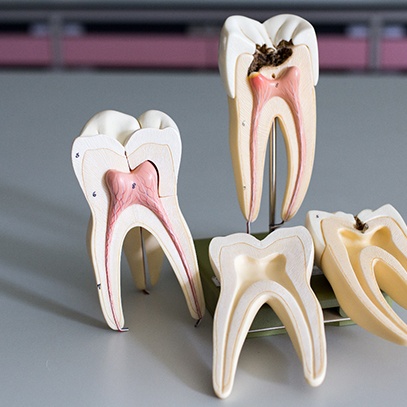Root Canal Therapy – Garland, TX
Stop Your Pain & Preserve Your Affected Tooth
Do you have a severe toothache that won’t seem to go away? This is one of the most common signs of an infection that is attacking the collection of soft tissues and nerves at the center of your tooth, called the pulp. Root canal therapy is a misunderstood treatment that actually allows our team at North Garland Family Dental to not only cure your pain, but also save your natural tooth from needing to be extracted. Call our office today to schedule a same-day appointment with an emergency dentist in Garland and minimize the chances of your smile sustaining additional damage.

Why Choose North Garland Family Dental for Root Canal Therapy?
- Same-Day Emergency Dental Appointments
- Multiple Methods of Dental Sedation Available
- In-Network with Cigna, MetLife, Delta Dental & More
Do I Need Root Canal Therapy?

Root canal therapy is typically recommended when your tooth is emanating severe, persistent pain that is keeping you up at night, preventing you from being able to focus, and impacting your daily life. While this is often the most common sign that you require this treatment, there are also others, like:
- Prolonged dental sensitivity to items that are hot and cold in temperature.
- A sharp pain or discomfort when biting down or chewing on food.
- Discoloration that causes a tooth to appear dark or gray.
- Swelling and redness of the gums surrounding the affected tooth.
- A pimple-like bump on the gums near the painful, discolored, or affected tooth.
If you notice any of these symptoms, contact our office immediately to schedule a same-day emergency appointment. Our team will jump into action figuring out what the underlying cause is and treating it.
The Process of Getting a Root Canal

Before we can determine whether you need a root canal, we’ll capture digital X-rays and conduct a thorough examination of your teeth and gums. Once your emergency dentist has diagnosed the problem at-hand, we’ll develop a plan for your treatment and walk you through it, being sure to answer any of your questions. Before your root canal begins, we’ll apply a local anesthetic to numb the area.
The process starts by creating a window within the tooth that will allow us access to the infected pulp within the inner chamber of your tooth. We’ll diligently remove the soft tissue and nerves, being sure to sanitize the chamber to make sure no harmful oral bacteria were left behind. We’ll restore the structure of your tooth using a tooth-colored substance called gutta percha before topping it off with a strong, durable dental crown.
The Benefits of Root Canal Therapy

Be sure not to believe every rumor you hear about root canal therapy, as this treatment is often the reason why patients are able to avoid tooth extractions and additional, more invasive treatments! Some other benefits of this treatment include:
- Results That are Aesthetically Pleasing: Your treated tooth will be topped off with a custom-crafted, tooth-colored dental crown, concealing any sign that it was treated or once infected.
- Virtually Pain-Less Procedure: Before we begin your treatment, we’ll numb the area to ensure you remain comfortable throughout the process.
- Preserves Your Natural Dental Structure: Although root canal therapy can be daunting, it keeps you from needing more invasive and costly treatments, like a tooth extraction and dental bridge or implant crown.
Understanding the Cost of Root Canals

How much will you end up paying for your root canal treatment? The answer is not set in stone, but the good news is that our team will be able to give you an estimate of the price once we have had a chance to learn more about your specific situation. If you need help fitting this important procedure into your budget, we will let you know what options are available. Below is some important information regarding the overall cost of having a root canal performed.
Factors That Can Affect Root Canal Cost

Some of the key factors that can end up affecting the amount you pay for your root canal treatment include:
- The Specific Tooth Being Treated: The anatomy of the teeth near the back of your mouth can make them more complex (and therefore more costly) to treat compared to the front teeth.
- How Complex the Case Is: Oftentimes, we can personally handle your root canal treatment. That being said, certain advanced cases may call for the help of a specialist who has their own pricing structure to consider.
- Additional Services: Patients who undergo root canal treatment typically need to pay for a crown as well. Said crown is essential for keeping the treated tooth safe.
Is it Cheaper to Pull My Tooth?

Tooth extraction procedures tend to cost less than root canal treatments, but the upfront costs of these services do not tell the whole story. When you have a tooth removed, it is usually recommended that you have it replaced as promptly as possible to avoid long-term oral health issues. That means you will also have to pay for a bridge, denture, or dental implant. However, root canal treatment can help you avoid the additional expenses of tooth replacement.
Does Dental Insurance Cover Root Canal Treatment?

The answer is typically yes, although it always pays to double-check; each dental insurance plan is different, and the benefits they provide tend to vary. Root canal treatment can be classified as a basic or major dental procedure depending on what plan you have, so coverage can be anywhere in the range of 50% to 80%. And of course, you have to account for your deductible (assuming you haven’t paid it yet) as well as your annual maximum.
Our team is used to working with various dental insurance plans, so if there’s anything you don’t understand about your benefits, we will be more than happy to take a closer look at the details with you and answer any questions that might be on your mind.
Other Options for Making Root Canal Treatment Affordable

What can you do to make paying for your root canal treatment easier? For one thing, you can sign up for our dental membership plan, which comes with a number of discounts on a variety of procedures. On top of that, we can help you apply for a low-to-no-interest CareCredit plan that lets you pay for treatment in monthly installments that don’t strain your budget too much. We’re ready to help you take whatever steps are needed to save your tooth at a price that works for you.
Root Canal FAQs
How Long Does it Take to Recover from a Root Canal?
Although the recovery time is a bit different for everyone, many patients are able to return to their usual routine the next day. Of course, if your job is physically intensive, then we may recommend taking a day or two off work to ensure you have plenty of time to heal. If the swelling or soreness hasn’t subsided by the three-day mark, then give us a call to schedule an appointment.
Can I Take Antibiotics Instead of Getting a Root Canal?
Although antibiotics can effectively treat infections in other areas of your body, they can’t eliminate an infection in the pulp of your tooth. So, to answer the question: you cannot take antibiotics instead of getting a root canal. The only way to restore your oral health is by getting root canal treatment or having the tooth extracted.
Can Root Canals Be Prevented?
Generally speaking, yes! Preventing your teeth from severe decay and damage requires a commitment to a solid oral hygiene regimen, including flossing each day and rinsing with an antimicrobial mouthwash consistently. You should also wear a mouthguard when playing sports and avoid unhealthy dental habits, like chewing on ice, to prevent cracks, which can result in an infection developing. Lastly, make sure that you prioritize your biannual checkups and cleanings. These routine appointments allow us to intervene with the necessary restorative care before root canal treatment is necessary!
What Happens if You Wait Too Long for a Root Canal?
If you wait too long to get a root canal, it may no longer be an option. In other words, if the root of the problem is left alone for too long, we’ll have no choice but to extract your tooth and put a dental bridge or implant in its place. That’s why we recommend scheduling the necessary restorative care when we first bring it to your attention; it could make all the difference when it comes to saving your tooth!
Are Root Canals Painful?
Perhaps one of the biggest misconceptions about root canals is that they are painful. They aren’t! That’s because we use a powerful numbing agent before removing the decayed and infected tissue. Of course, if you are still a bit nervous about the procedure, you can also add sedation dentistry to your treatment plan. This will help alleviate your nerves so you have the positive dental experience you deserve.






